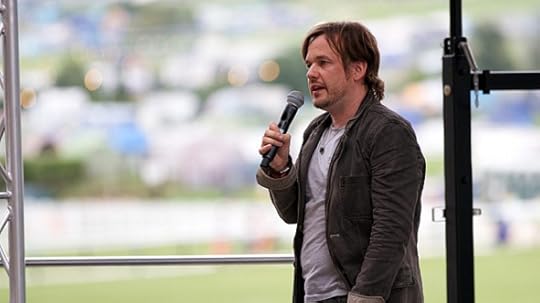Peter Rollins's Blog, page 24
October 7, 2014
The Making of an Event: Tricks of the Light
[image error]
This time three years ago I remember sitting over a Guinness in a dingy bar in Belfast, telling my friend Adam about an event I was planning. I was in the early stages of putting together a retreat in Northern Ireland where a small number of people would be invited to hang out, unwind, and talk about the project of Radical Theology. In response Adam, who spends much of his life setting up and running up amazing arts festivals, looked at me in bewilderment and laughed,
“You mean people would actually come here to listen to you talk for two days?”
“Yeah”
“And they’d pay for this?”
“Um, I guess so”
“Listen, I don’t know your world, and I don’t want to tell how to do things, but if it was me, this is what I’d do…”
He then leant in and started to describe a mythical event in the cultural heart of the city, an event spread over multiple bars, cafes and galleries, all within spitting distance of each other. He talked wildly about musicians, poets, parties, tours, story telling, whiskey tasting, workshops, movies and more. Then he described how he would have me curate the whole thing,
“You’d still speak,” he told me, “but you’d also hand pick artists, activists and thinkers who’ve inspired you. You’d create an immersive experience that people would remember for life”
He knew about my work with the transformance art initiative ikon, and openly questioned why, when I knew so many creative people, I’d want to do a retreat. Why do that when I could do a festival, a festival of incendiary ideas.
There and then I scrapped my original plans. Sure it would be a lot more work, but I couldn’t go back. This was not simply an event I’d like to make happen, it was an event I’d want to go to.
Over the drink I offered my friend the job of helping me put it together. And, being a little worse for wear, he foolishly accepted. The rest, as the saying goes, is history.
As I write this we’ve already had two festivals and are currently planning a third.
I love my work. I get to travel the world and meet wonderful people. But out of everything I do, these festivals have turned out to be highlight. Not only do I get to introduce people from all over the world to my beloved home. But I get to bring together some of the most important and influential people in my life to contribute to the program. We create a four day community of friends, and then throw in an eclectic mix of magicians, musicians, politicians, peacemakers, poets, activists, artists, writers, therapists and filmmakers.
What’s more, this year is already shaping up to look like the best one yet. We’ve just confirmed the philosopher and theologian John Caputo (who is a prime influence in my own work), and other great additions are in the works.
We fully expect to sell out this year (the early bird tickets went in less than a day), so if you want to be part of this experience, book now by following this link.
I’m inviting people who’ve been before to say what they thought in the comments section below (so keep an eye on it).
You can see pictures from the previous events here and here.
September 22, 2014
Perfection Isn’t What It’s Cracked Up To Be
This is a talk I gave in Chapel Hill, NC as part of my Transgression Tour. In this talk I explore how ideological systems operate and how we might be able to evoke positive change in personal, religious and political systems
The People Are Naked… Don’t Tell the Emperor!
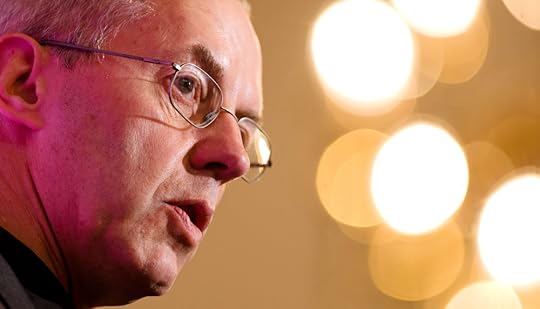
One of the popular trends within the church today involves affirming that doubts are a part of faith alongside the claim that God is faithful to us throughout these doubts. The most recent example of this comes from the Archbishop of Canterbury who said that he sometimes questions whether there is a God. In the same interview he goes on to claim that his faith is not however about feelings, “it is about the fact that God is faithful,” indeed he goes on to claim, “the extraordinary thing about being a Christian is that God is faithful when we are not.”
What we see here initially strikes us as incoherent, for the Archbishop effectively questions whether God exists, while at the same time believing in the “fact” that God does exist. As such, this could be laughed off as the dying attempts of a religious individual to maintain their beliefs (or their job).
However the approach taken by the Archbishop might actually expose a much more ubiquitous structure, one that operates widely within both theist and atheist camps: a structure that the practice of Radical Theology seeks to free us from.
To begin with, let us call the God that the Archbishop continues to affirm (following Lacan) “the Big Other.”
The Big Other is a slippery phrase, one that is initially hard to get ones head around. So let us create a scenario that might make this term a little easier to understand. Imagine being in a teeming nightclub at three in the morning. Looking around the room it appears that everyone is having a great time. There is energetic music, dancing, drinking, flirting and animated conversation everywhere.
Yet, as you look more closely, you begin to suspect that some, many, or even all, of the people in the room are actually concealing a lack of enjoyment. Indeed it feels like there is a veil of fun covering the room that is obscuring another dimension, a veil that seems to be getting thinner and thinner as the night wears on. As you stand in the middle of the room you can’t help feeling that everyone in the club has agreed to keep up a façade. In fact, as you stand there, deep in thought, a series of people become agitated and say things like, “cheer up,” “smile,” or “have another drink.” It is as if you are breaking some kind of taboo by looking pensive.
This fictional scenario is obviously very possible; indeed it might even be very common. While thinking about it, two questions immediately arise,
Who is everyone trying to fool?
What is the point of the pretense?
It is possible that people are trying to convince their colleagues that they are having a good time. But most of us are dimly aware that everyone else in the room is as insecure and awkward as we are. So it starts to seem like we are all actually trying to fool someone else who isn’t in the room.
Those in the nightclub can be said to be engaged in a structural deception of the type found in church. When people sing contemporary worship songs that proclaim “all they want is Jesus,” they are obviously not claiming what is being sung (after all they want lots of other things). Instead they seem to want to convince the God they are singing to that they are the type of person who only wants Jesus (affirming what is called their “Ideal-ego”). In the nightclub the same logic is at work in that some outside god is being treated as a figure that we must attempt to fool by our actions. Of course no one in the nightclub actually believes in such a figure. Yet the belief functions in a material way regardless. There is a subject who must remain fooled by our actions, a subject whose ignorance causes us to avoid a confrontation with our own struggles.
This is a version of the Emperors new clothes, except that we, the people, are naked. Maintaining the illusion only as long as the Emperor is fooled.
This, in a nutshell, is an example of the Big Other. It is that non-existent entity that we submit to in order to avoid a confrontation with our own internal crisis.
What we witness clearly in the interview with the Archbishop is a doubt over the God proclaimed in the actual existing church, which is cloaked in a belief in a Big Other. For simplicities sake we can say that there are broadly three possible positions he could take about the God proclaimed overtly in church,
I believe
I doubt
I don’t believe
But none of these need touch his more fundamental commitment to the Big Other.
In the same way, someone could affirm one of these three positions while rejecting the Big Other. Indeed I would say that this is the project of Radical Theology.
The point of all this is to say that an atheist could very well claim “I don’t believe in God,” while still making the move of the Archbishop: unconsciously affirming a Big Other who is able to protect them from accepting the consequences of their position. Just as we witness in the nightclub example, such a belief in the Big Other always betrays itself in some way (such as prayer, listening to religious music, supporting ones parents beliefs etc.).
This is why Radical Theology makes the claim that popular atheism is not atheistic enough. For it only attacks the easy target that is the anthropomorphic God of contemporary Christianity. It has nothing to say about the Big Other. Radical Theology, on the other hand, seeks to expose how the Big Other – that protects us from confronting our own personal, religious and political crisis – is a fiction. Indeed Radical Theology is a project that claims this assault on the Big Other is the core message of Christianity.
What would have been more scandalous and insightful than this interview with the Archbishop would be to hear a high profile church leader saying, “I happen to believe in God much of the time, but I know that, in those moments, the God who would protect me from myself does not exist.”
The People are Naked… Don’t tell the Emperor!

One of the popular trends within the church today involves affirming that doubts are a part of faith alongside the claim that God is faithful to us throughout these doubts. The most recent example of this comes from the Archbishop of Canterbury who said that he sometimes questions whether there is a God. In the same interview he goes on to claim that his faith is not however about feelings, “it is about the fact that God is faithful,” indeed he goes on to claim, “the extraordinary thing about being a Christian is that God is faithful when we are not.”
What we see here initially strikes us as incoherent, for the Archbishop effectively questions whether God exists, while at the same time believing in the “fact” that God does exist. As such, this could be laughed off as the dying attempts of a religious individual to maintain their beliefs (or their job).
However the approach taken by the Archbishop might actually expose a much more ubiquitous structure, one that operates widely within both theist and atheist camps: a structure that the practice of Radical Theology seeks to free us from.
To begin with, let us call the God that the Archbishop continues to affirm (following Lacan) “the Big Other.”
The Big Other is a slippery phrase, one that is initially hard to get ones head around. So let us create a scenario that might make this term a little easier to understand. Imagine being in a teeming nightclub at three in the morning. Looking around the room it appears that everyone is having a great time. There is energetic music, dancing, drinking, flirting and animated conversation everywhere.
Yet, as you look more closely, you begin to suspect that some, many, or even all, of the people in the room are actually concealing a lack of enjoyment. Indeed it feels like there is a veil of fun covering the room that is obscuring another dimension, a veil that seems to be getting thinner and thinner as the night wears on. As you stand in the middle of the room you can’t help feeling that everyone in the club has agreed to keep up a façade. In fact, as you stand there, deep in thought, a series of people become agitated and say things like, “cheer up,” “smile,” or “have another drink.” It is as if you are breaking some kind of taboo by looking pensive.
This fictional scenario is obviously very possible; indeed it might even be very common. While thinking about it, two questions immediately arise,
Who is everyone trying to fool?
What is the point of the pretense?
It is possible that people are trying to convince their colleagues that they are having a good time. But most of us are dimly aware that everyone else in the room is as insecure and awkward as we are. So it starts to seem like we are all actually trying to fool someone else who isn’t in the room.
Those in the nightclub can be said to be engaged in a structural deception of the type found in church. When people sing contemporary worship songs that proclaim “all they want is Jesus,” they are obviously not claiming what is being sung (after all they want lots of other things). Instead they seem to want to convince the God they are singing to that they are the type of person who only wants Jesus (affirming what is called their “Ideal-ego”). In the nightclub the same logic is at work in that some outside god is being treated as a figure that we must attempt to fool by our actions. Of course no one in the nightclub actually believes in such a figure. Yet the belief functions in a material way regardless. There is a subject who must remain fooled by our actions, a subject whose ignorance causes us to avoid a confrontation with our own struggles.
This is a version of the Emperors new clothes, except that we, the people, are naked. Maintaining the illusion only as long as the Emperor is fooled.
This, in a nutshell, is an example of the Big Other. It is that non-existent entity that we submit to in order to avoid a confrontation with our own internal crisis.
What we witness clearly in the interview with the Archbishop is a doubt over the God proclaimed in the actual existing church, which is cloaked in a belief in a Big Other. For simplicities sake we can say that there are broadly three possible positions he could take about the God proclaimed overtly in church,
I believe
I doubt
I don’t believe
But none of these need touch his more fundamental commitment to the Big Other.
In the same way, someone could affirm one of these three positions while rejecting the Big Other. Indeed I would say that this is the project of Radical Theology.
The point of all this is to say that an atheist could very well claim “I don’t believe in God,” while still making the move of the Archbishop: unconsciously affirming a Big Other who is able to protect them from accepting the consequences of their position. Just as we witness in the nightclub example, such a belief in the Big Other always betrays itself in some way (such as prayer, listening to religious music, supporting ones parents beliefs etc.).
This is why Radical Theology makes the claim that popular atheism is not atheistic enough. For it only attacks the easy target that is the anthropomorphic God of contemporary Christianity. It has nothing to say about the Big Other. Radical Theology, on the other hand, seeks to expose how the Big Other – that protects us from confronting our own personal, religious and political crisis – is a fiction. Indeed Radical Theology is a project that claims this assault on the Big Other is the core message of Christianity.
What would have been more scandalous and insightful than this interview with the Archbishop would be to hear a high profile church leader saying, “I happen to believe in God much of the time, but I know that, in those moments, the God who would protect me from myself does not exist.”
September 18, 2014
Getting Thrown Out of Prison: Judge Dredd, the Oppressed, and Salvation
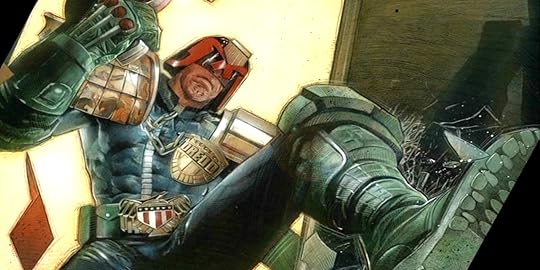
Judge Dredd is a law enforcement officer working in a dystopian future ravaged by radioactive waste. As a Judge in Mega City One he has the authority to arrest, sentence, and execute criminals at the scene of a crime. The judgments are harsh, immediate, binding and given without considering the wider context.
At a superficial level this system would seem to express the most concrete form of judicial system imaginable. A Judge comes to the scene of the crime, assesses what has happened there and pronounces a sentence. This could then be contrasted with what we might call a system that abstracts from what is happening. Asking broader questions about the conditions that encouraged the person to commit the crime in the first place.
This description of abstract and concrete is however very different from the more philosophical understanding of these terms. From this perspective Dredd can be seen as the ultimate example of enacting an abstract system of justice. Instead of taking into consideration the complex network of concrete conditions that would be required to properly understand and deal with the crime, Dredd abstracts the act from its frame and treats it as a type of isolated monad.
For Dredd, a crime is a problem that must be punished rather than the solution to a problem that must be understood.
When crime is abstracted in this way we fundamentally fail to see how it is intricately connected to the society from which it arises. For instance, if there are lots of people with mental health issues in the prison system, then this signals that we live within a broader political context that is unable to adequately help those who suffer in this way.
It’s easy to engage in something like prison ministry when we see ourselves helping those in need. But this approach obscures the fact that those who are in prison actually have something much more valuable to offer us. For they are the ones who can expose a crisis within the society we support/participate in.
Within religious groups there is a tendency to apply abstraction to those who are incarcerated. In this way they are effectively inoculated against confronting the problems that exist within their world that actually create the conditions they are responding to.
One might be able to help prisoners by writing letters or sending gifts, but prisoners have the potential of offering something much more significant: a type of salvation for the system that holds them.
For if we look at the those within the prison system, get to know them and discover the context that contributed to their imprisonment, we can begin to glimpse how the system we participate in is corrupt, violent and full of darkness.
This is, of course, a disturbing activity to engage in. For, in doing so, we are no longer able to maintain the fantasy that we are a type of hero helping poor, unfortunate people. Rather we realize that we need to do this work in order to discover how poor and unfortunate we are, and how violent the structure we participate in is for some people.
Thankfully there are some people who see their prison work in precisely this way. But the ones I know cannot be named, for if they were, they would be banned from reentering the prison system. There activity is allowed only when it is viewed as giving alms to the evil. If it is seen as exposing the injustice of the wider system they get throwing out of prison.
This is because the prison system is fundamentally designed to help us avoid confronting this reality. We much prefer to think of the prison system as protecting us from evil, rather than as protecting us from facing the disavowed evil (racism, economic injustice, lack of education, unemployment, underemployment etc.) that we dance with daily.
This same logic can be perceived in the way that religious organizations often view the homeless. Congregants are invited to get involved with homeless ministry to give something back, to offer people a hand up or to bring some good news. What we see then is nothing but an abstraction that makes us feel good, while protecting ourselves from the danger that we might be provoked to fundamentally change how we live by seeing ourselves as part of the reason why there are homeless people in the first place.
From a societal point of view, homelessness is not a simple problem; it is an obscene solution to a problem. For instance, in a place where there are lots of people on the streets who are suffering from being in the military, this makes manifest a crisis within that system. The solution then arises in the creation and management of those people on the streets.
A large homeless population signals the concrete manifestation of a failure within the system it arises within, exposing a crisis within that world. In this way, the homeless become the potential instrument of our fundamental transformation. We might be able to offer them some food and warm clothes, but they hold out the possibility of our salvation. When a state is forced to face the concrete issue of homelessness or crime (rather than treat them abstractly as divorced from the material conditions that create them), it has two options. Either it has to show that it doesn’t care – thus exposing it’s heart – or it has to work to make real political change.
So then, when we attempt to reach out to those who are persecuted, ignored and rejected by society, we should do so not because we have some good news to give, but because we will find there a good news to receive.
September 16, 2014
Rebellion Without a Cause – How to Start a Revolution
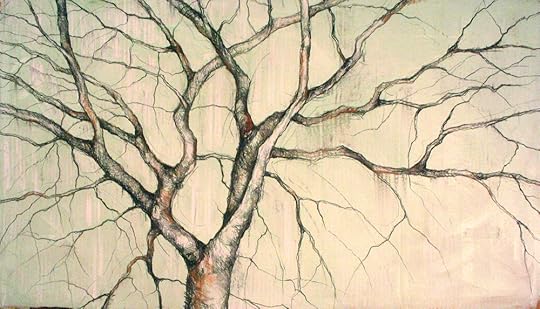
Reforming a cultural, political or religious system doesn’t begin by articulating a ready-made alternative. The problem is that we’re generally so immersed in a given ideology that we can’t even imagine a genuine alternative that isn’t simply a reshuffling of what already exists. Instead of carefully constructed alternatives the revolutionary figure begins by attempting to expose the repressed crisis that already exists within the system itself.
To extrapolate we can reflect upon a situation explained to me by a friend with fundamentalist parents. Each time they come to visit she has to hide all the alcohol in her house. The interesting thing about this situation however is that it was actually her parents who told her to do this. By hiding the alcohol she was able to avoid arguments and retain a modicum of civility.
Here we see how a family system is able to avoid confronting a crisis by engaging in a shared pretence. The point is not that a crisis would occur if her parents saw alcohol, rather a crisis that already exists within the family would simply be made explicit. Once made explicit something would need to happen,
An argument, followed by a return to repression
A split within the family
A change within how the family relate
The first is most likely in that systems strive to retain equilibrium. But, if the repressed is continually brought up, either the family unit will collapse completely, or it will restructure itself in a much more healthy and honest way. One can’t chart in advance what will happen, but the act is still worthwhile: for it will either expose the violence already implicitly within the family system, or it will be the engine that drives positive transformation. You roll the dice and you take responsibility for what happens.
In terms of religion the life of Luther is an interesting example of this process. Luther didn’t want to create the Protestant Church, he simply wanted to bring to the surface the problems that where existing within the institution at the time. His work was initially resisted and so a new type of church was birthed. Yet he also had a dramatic impact on the system that rejected him. It gradually had to face the problems Luther had exposed and reform itself in light of them.
Protestantism was not some pre-conceived system that Luther wanted to start, it was the unexpected outworking of his attempt at internal reformation. An internal reformation that involved bringing up the unspoken transgressions of the system he was part of.
This is analogous to what we see in the development of philosophy. Practically speaking, philosophy began life by questioning the things that were taken for granted by the majority of people. It began life as a systematic, critical exercise of interrogation.
Old ideas where questioned and new theories developed.
As time went on some theories became established, eventually breaking off into new disciplines. In the beginning there was only philosophy, but gradually biology, chemistry, physics, sociology, psychology, phenomenology and the other sciences branched out. Philosophy today continues in its work of interrogating what we take for granted, operating within the sciences it helped birth. Creating the conditions for the conception of others.
The philosophical spirit is thus a spirit that haunts, a spirit that opens up new areas of thought and deepens already existing ones by questioning the things that are taken for granted. In this reading, philosophy can be seen to have two revolutionary effects,
Questioning the fields of knowledge already in existence
Developing new scientific fields
As with Luther, the latter often begins organically and unexpectedly as a secondary effect of the former. The philosopher is not initially aiming to create a distinct field, but rather perceives some problems in a field that already exists. She asks questions, pushes and prods, and, if things progress, creates a space for some advance or revolution in thought.
In my own work I identify these two interrelated parts. On the one hand I want to bring the unspoken transgressions of actual existing Christianity to the surface, and on the other, I’m interested in what new historical manifestation will grow as a result. My public speaking is related primarily to the first, while my development of new collectives is connected to the second. While I have a personal belief in what this new concrete manifestation might look like, I also freely admit that I’m likely wrong.
But this isn’t important. For the only truly vital part of this endeavor is bringing to the surface what lies hidden beneath. If this is done effectively then the old will rupture/reconfigure and something new will be born.
Naming the unspoken can be a difficult job, for the unspoken differs from family to family, community to community, ideology to ideology. In the church world, part of the work involves bringing up the disavowed doubts, questions and intellectual incredulity that lies in a palpable way beneath the surface.
This will involve church leaders coming forth with the courage to speak openly and articulately about those things in their own lives. A recent example of this can be seen in Jay Bakker’s interview with the comedian Marc Maron. As someone who grew up in the center of a religious empire, he knows what it was like at the very heart of the beast. He knows of the walls that are built there to protect people from anxiety and questioning, as well as the damage that those walls cause to countless lives. More than this, in the interview he speaks authentically about how they devastated his own life and how he has gradually learned to break those walls in his own journey toward created a healthier community.
You can listen to the interview here,
http://peterrollins.net/wp-content/uploads/2014/09/WTF_-_EPISODE_530_JAY_BAKKER.mp3
September 8, 2014
Transgressions Tour, Chapel Hill, NC
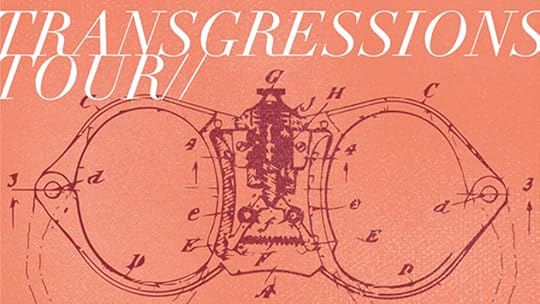
Join me for an evening of incendiary reflection and conversation as I interrogate how we might cultivate life-giving, transformative zones that challenge social, political and religious oppression. By employing the figures of the Trickster and the Fool I’ll explore how we might engage in truly subversive acts, acts that operate in the name of life, liberation and lasting change. We’ll be meeting in the West End Wine Bar, with doors at 7:30 and kick off at 8:00.
September 3, 2014
Geestdrift festival, Holland
Geestdrift festival is an event that brings together public theology , art, social justice and music to create an intimate festival in Utrecht. For more information, visit the Facebook page here.
August 31, 2014
Divine Decay: Living the ‘Death of God’
http://peterrollins.net/wp-content/uploads/2014/08/GB13-054.mp3
In this talk I explore the role of Christ collectives as locations in which people undergo the death of God so as to enter into the return of God in the midst. In contrast to the actual existing Church, which generally posits God as a guarantee of meaning I interrogate the idea of God as that which breaks meaning apart and the Christ collective as the place that helps enables us to live without a compass or a map.
How to Be an Idiot: Christ and the Symbolic Order
In this talk I explore a subversive reading of Christianity, one that views it as a way of life that critiques ideology. By showing how the Hebrew and Christian scriptures contain an incendiary message of resistance against religious Sovereignty, I show how fidelity to the Christ event involves a struggle against all systems of Sovereignty.
Peter Rollins's Blog
- Peter Rollins's profile
- 314 followers



